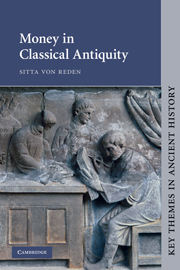Book contents
- Frontmatter
- Contents
- List of figures and tables
- List of maps
- Preface and acknowledgements
- Greek and Roman monetary system and coin denominations
- List of abbreviations
- Maps
- Introduction
- 1 Monetization: issues
- 2 Monetization: cases
- 3 Monetary networks
- 4 Cash and credit
- 5 Prices and price formation: issues
- 6 Prices and price formation: a case study
- 7 Sacred finance
- Epilogue: monetary culture
- Appendices
- Glossary
- Bibliographical essay
- References
- Index
7 - Sacred finance
Published online by Cambridge University Press: 05 August 2012
- Frontmatter
- Contents
- List of figures and tables
- List of maps
- Preface and acknowledgements
- Greek and Roman monetary system and coin denominations
- List of abbreviations
- Maps
- Introduction
- 1 Monetization: issues
- 2 Monetization: cases
- 3 Monetary networks
- 4 Cash and credit
- 5 Prices and price formation: issues
- 6 Prices and price formation: a case study
- 7 Sacred finance
- Epilogue: monetary culture
- Appendices
- Glossary
- Bibliographical essay
- References
- Index
Summary
INTRODUCTION
In post-war scholarship money has been approached almost exclusively within a secular framework of understanding. Religious meanings of money have not received any serious attention, not least because Aristotle, the most influential ancient authority on monetary history and theory, does not proclaim a particularly close connection between money, cult and ritual (see above, introduction and chapter 2). Temple finance tends to be dealt with in accounts of individual temples or ancient religion more generally, but is not well integrated into ancient economic history. However, the consecration of property, fines and tithes, and the thesauration of some or all of a collective's wealth in temples and shrines, suggest a strong interpenetration of political economics and sacred finance. In the classical city, moreover, a city's patron god had the important function of creating identity and trust in coinage, as well as adding force to commercial contracts backed up by oaths. Temples performed the function of guarding public and private contracts recorded on stone a role which before the Hellenistic period secular institutions were unable to fulfil.
It has been argued, furthermore, that, if not coinage itself, at any rate important conceptual preconditions for the emergence of money in the form of metal tokens developed in the context of cult practice. Bernhard Laum at the beginning of the twentieth century argued that the most important aspect of money was its function as a substitute. The idea of substitution was typical of ancient cult.
- Type
- Chapter
- Information
- Money in Classical Antiquity , pp. 156 - 185Publisher: Cambridge University PressPrint publication year: 2010

